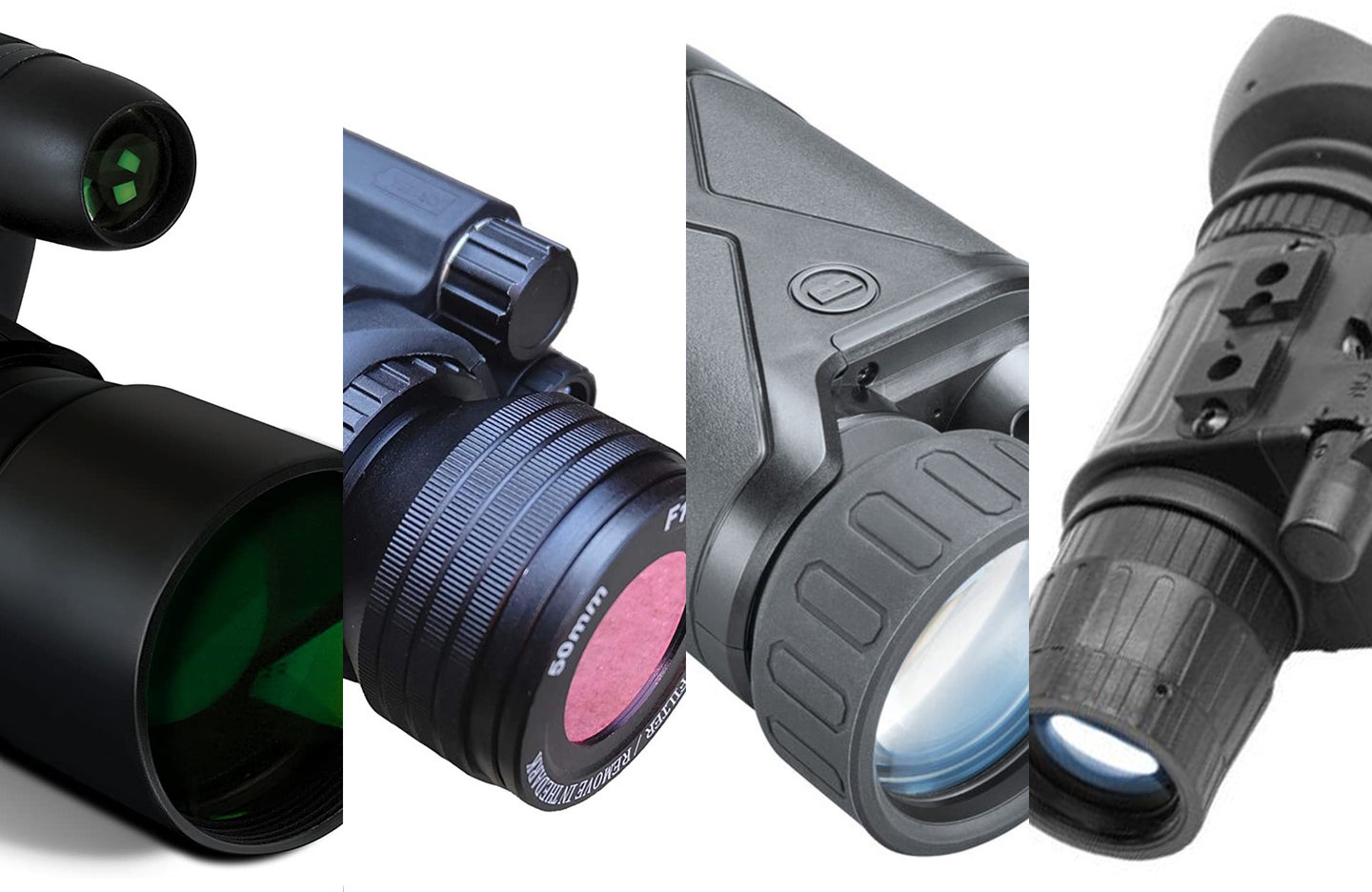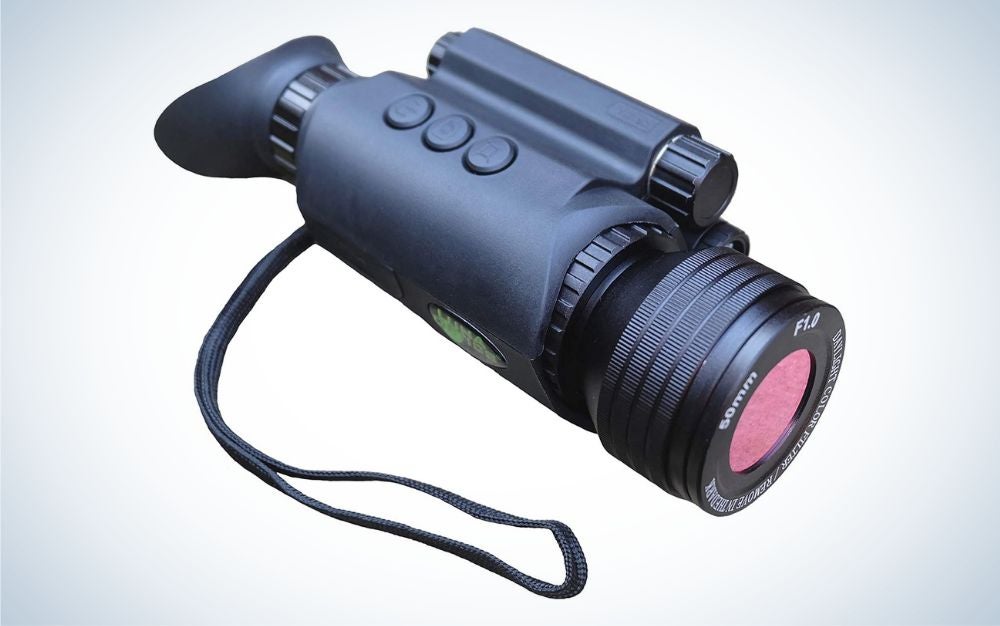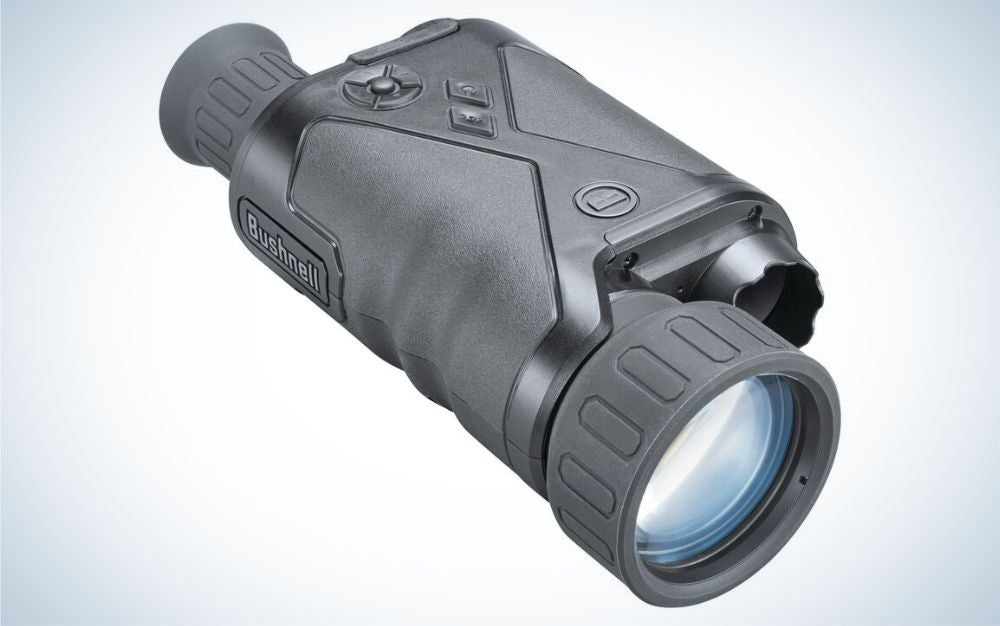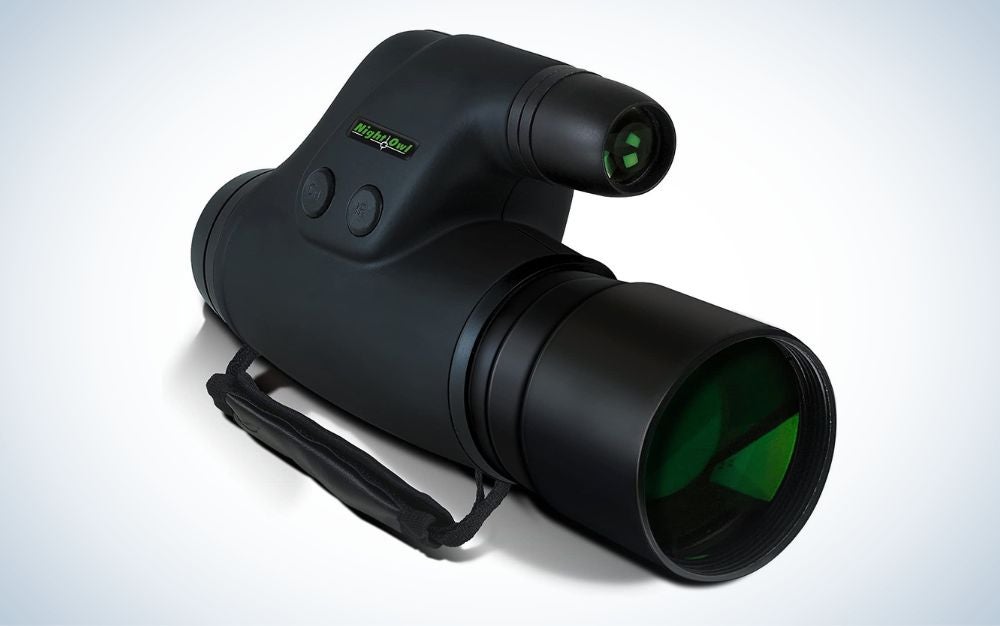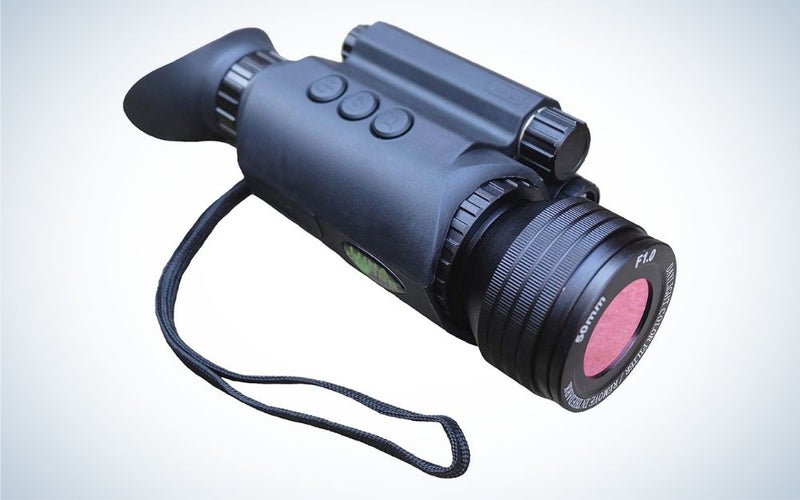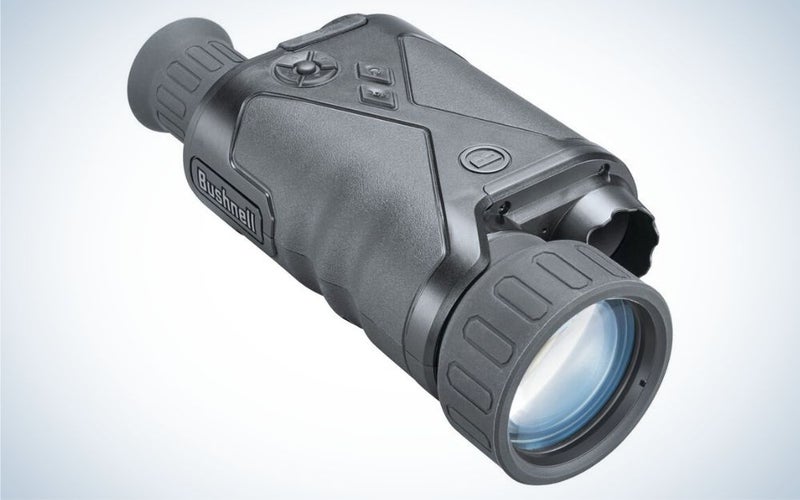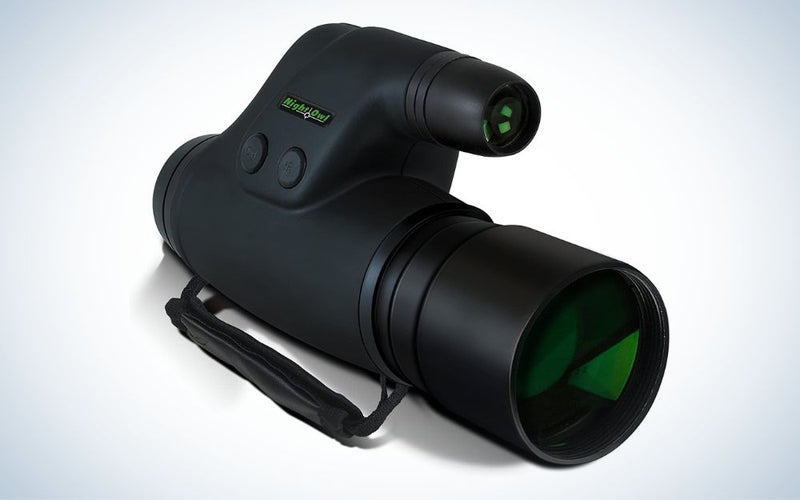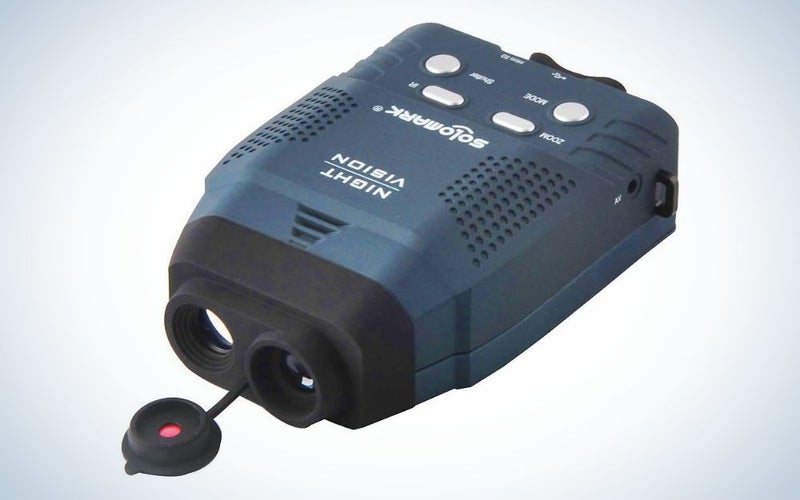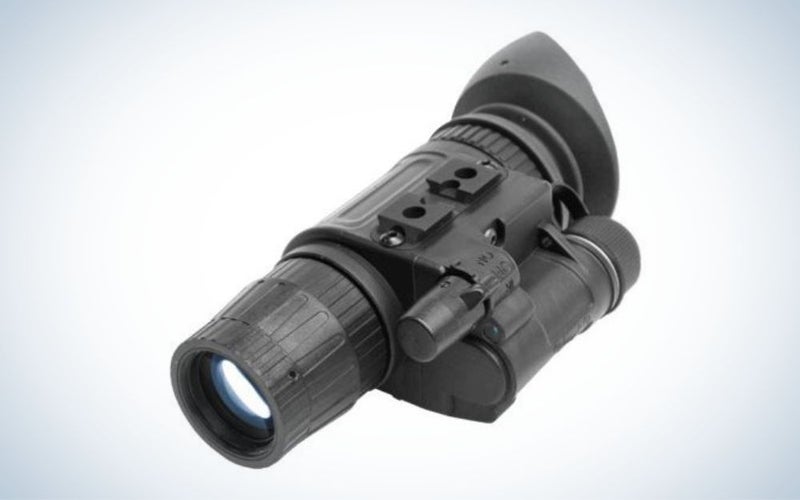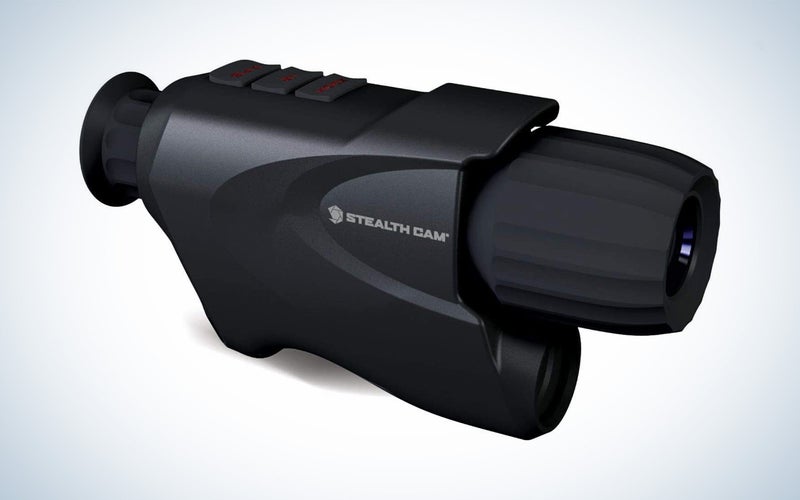We may earn revenue from the products available on this page and participate in affiliate programs. Learn more ›
Whether you are looking for wildlife, making sure no one approaches your property, or just want to be able to know what’s out ahead of you in the night, reliable night vision monoculars can light up an otherwise dark world.
Night vision allows you to see in the dark, and as the name might have you realize, a monocular does this for you using just one eye. Monoculars are preferred by some as the simpler monocular structure often comes at a lower price and higher quality as you don’t need to double the optics and technology within. Some will prefer night vision binoculars, though, as using just a single eye can limit your field of vision and cause some eye strain. Whatever you choose, here are the best night vision monoculars and some things to consider before you buy.
- Best overall: Luna Optics 6-36X50mm Digital G3 Day & Night Vision Monocular
- Best value: Bushnell Equinox Z2
- Best budget: Night Owl NOXM50 Night Vision Monocular
- Best under $100: Solomark Night-Vision Monocular
- Best for professionals: ATN NVM14-4
- Best for beginners: Stealth Cam Digital Night Vision Digital Monocular
Things to consider when shopping for a night vision monocular
Weight
If you are carrying this into the backcountry while hiking, hunting, or doing anything else that will have your belongings on your back, weight is an important consideration. Lighter tools are easier to carry, though that weight savings often comes at a cost.
Size
Similar to weight, the size of your night vision device will dictate how likely you are to bring it with you. Smaller, more compact devices are easier to justify in the cramped space of a backpack or camp bag. Though, if you will use these at home or from your vehicle, this may not be as big of a consideration.
Magnification power
Night vision can not only light up the night, often it can magnify your view like a pair of binoculars to give you better view off in the distance. Greater magnification often comes at a higher cost, but consider picture quality as well. Some devices will offer digital magnification along with optic magnification, but just like expanding your fingers to zoom in on a phone photo, this often comes with a degradation of the image quality.
Battery power
Seeing at night requires power, and you won’t be plugging these devices into the wall. Some night vision devices run on disposable batteries while others have built-in rechargeable batteries. This can affect prices as well as run time. Some prefer the ease of recharging, while others like to have their night vision run on disposable batteries so that they can easily bring an extra set off-grid when they are unlikely to return to a charging location before the batteries die.
Objective lens
Objective lens, or effective diameter, is the diameter of the monocular lens. A larger lens will collect more light, and enhance the clarity and brightness of your image.
Analog vs. digital night vision
Most night vision relies on infrared light outside our visible light spectrum. Analog night vision uses an image intensification tube to amplify the light in an image. Using your analog night vision in bright conditions can ruin the sensitive technology within the device, whereas digital night vision since it just converts the light to electrical signals, will be unaffected. Digital devices give sharper, clearer images but are often far more expensive.
Digital night vision converts the infrared light to electronic signals. These often come in three to four generations, generation 1, 2, 3, and 4 with the quality and brightness of the image increasing in each generation. These images are much sharper, and clearer, though they are often more expensive.
You may also find thermal night vision which creates images from the heat these objects let off, though, since this technology is more advanced, it is usually far more expensive than either analog or digital infrared night vision.
Durability
Consider how you will use your night vision. If it will stay in the car or on the porch, something cheaper can work but if you know you’ll be putting it through the ringer, adding features like a waterproof body can be well worth the cost.
Cost
As with any purchase, cost will likely be a main factor. Consider the things you need, like magnification power, features, and battery life as you make your purchase to get the most out of your money. Entry levels can be found under or near $100 while it’s easy to spend deep into the thousands.
Best night vision monoculars: Ratings & reviews
Best overall: Luna Optics 6-36X50mm Digital G3 Day & Night Vision Monocular
Luna Optics
Why it made the cut: If you want excellent image performance, then this is the model to get.
Specs
- Type of vision: Digital
- Magnification power: up to 36x
- Battery type: Rechargeable
- Weight: 1.1 pounds
- Dimension:180 x 80 x 60 mm
Pros
- High quality image
- Long effective range
- Great connectivity
Cons
- Price not for beginners
For the user who wants great range and incredible performance, this is a spectacular night vision monocular that will meet most of your needs at a price that, while not cheap, won’t entirely break the bank.
Many will love the exceedingly clear 12.2 MP images and 1080p 60fps footage through the 50mm objective lens that will give you a clear image of the night thanks to this G3 digital night vision. And that comes with magnification anywhere from 6X to 36X. The included IR illuminator also means you can use it in complete darkness.
You can save these images or stream them directly to a device like a tv or cell phone. If you want improved stability for images at the limit of the 400m range, this device is also equipped with the hardware necessary to connect it directly to a tripod. The device is also rechargeable with a 3.5-hour battery life, so you don’t need to worry about bringing extra batteries out into the field with you.
While it is not fully waterproof, it is water resistant and ready to operate at extreme temperatures from 14°F to 122°F. And if you do push the limits, this device also has a one-year warranty.
Best value: Bushnell Equinox Z2
Bushnell
Why it made the cut: You can save some money and still get powerful performance if you don’t need a ton of features.
Specs
- Type of vision: Digital
- Magnification power: 6x
- Battery type: 4 AA
- Weight: 1.7 pounds
- Dimension: 191 x 98 x 64 mm
Pros
- Value for the price
- Wi-fi enabled
- Waterproof
Cons
- Relatively heavy
- Feature light
This affordable monocular by Bushnell is light on features but makes up for it with simple operating, connectivity, and clear images. The waterproof body makes it a great option for big adventures and small.
This digital monocular night vision gives a clear view from up to 1000 feet away. How clear? The monocular is capable of 1080p quality video during the day or night, as you can use the 6X magnification whether it is daytime or nighttime. And in complete darkness, the IR illuminator will still let you see.
The image is clear thanks to its 55mm objective lens that provides little distortion to the edge of the image. While it does not have a ton of features, it is wifi enabled and can sink saved video to a phone, computer, or tablet, and can also live stream directly to a cell phone while in use to give you and others the same view of the night.
Best budget: Night Owl NOXM50 Night Vision Monocular
Night Owl
Why it made the cut: This cheap option performs above its price tag.
Specs
- Type of vision: Digital
- Magnification power: 5X
- Battery type: 3-volt Type-123
- Weight: 1 pound
- Dimension: 197 x 96 x 63 mm
Pros
- Affordable Gen 1 performance
- Long battery life
Cons
- Non-standard battery not included
- Some trouble focusing
- No warranty
This is a great value for the user looking for good performance at a great value.
The 50mm objective lens provides a satisfying image with 5X magnification, thanks in part to the real glass optics used in this G1 night vision. Some other, lesser quality monoculars opt for plastic lenses that can distort an image.
Of course, at this price, this night vision is not perfect as the image can distort some at the edges and the lack of an eye cup on the end of it means that some light will escape, and the image might suffer. If there is total darkness, you’ll still be able to see thanks to a built-in IR illuminator.
The image is adjustable to match your eyesight, but finding a perfect focus can still be a bit difficult. The soft-touch rubberized finish adds some durability and impact resistance.
Best under $100: Solomark Night-Vision Monocular
SOLOMARK
Why it made the cut: Its price puts it firmly in impulse purchase territory.
Specs
- Type of vision: Digital
- Magnification power: 2x
- Battery type: 4 AA
- Weight: 11.5 ounces
- Dimension: 147 x 101 x 47 mm
Pros
- Good battery life
- Good warranty
- Less than $100
Cons
- Image sufferers when zoomed
- Small viewing angle
For someone looking to spend very little money but still get some night vision capabilities, this might be the perfect fit, coming in impressively under $100.
It will light up the night, even in total darkness, with its IR illuminator that has several levels of illumination to help you find the proper brightness. But the performance is less than many of its competitors. It has a lower-quality image and is only effective at 328 feet. While it does have four zoom levels, they top out at 2x, and image quality will suffer as you use that zoom. At any distance, it also has a smaller viewing window than most, so your sight picture will be smaller than some of its competitors.
Even still, this compact and lightweight digital night vision will give you a view into the dark and has handy features like an included SD memory card, carrying case, and ability to wire it (not wireless) to other viewing screens. While it runs on AA batteries, they do provide a good battery life. On top of that, it comes with a two-year limited warranty.
Best for professionals: ATN NVM14-4
ATN
Why it made the cut: It’s bright, powerful, and packed with features that pro users require.
Specs
- Type of vision: Digital
- Magnification power: 1X
- Battery type: CR123A or AA battery
- Weight: 11.3 ounces
- Dimension:119 x 48 x 69 mm
Pros
- Auto brightness adjusting
- Headgear and gun mountable
Cons
- A whole lot of money
- Heavier than most
This is a top-of-the-line night vision for professional use, and it comes with a professional price tag.
This night vision has a truly cutting-edge G4 digital optic with a 27mm objective lens diameter that will clearly light up the night with an impressively wide field of vision. It also comes with a slew of great features to optimize performance, including automatic brightness adjustment to make sure you are always getting your most clear image, and excessive light won’t do any damage to the technology. And if it is completely dark, the included IR illuminator, called ATN’s Total Darkness Technology, will allow you to see when the lights are down.
The device is also built to professional-grade and completely waterproof and can work in extreme temperatures from -40°F to 131°F. It can also be used in hand, mounted to a helmet or a gun, and will work in combination with your scopes or sight. On top of that, it will work for 50 hours on a single battery.
For the highest-end user, it has unparalleled performance with a two-year warranty. Though, if you need magnification, this is not your device.
Best for beginners: Stealth Cam Digital Night Vision Digital Monocular
Stealth Cam
Why it made the cut: A simple but effective night vision monocular design accompanies a low price tag, which makes this appealing to beginners.
Specs
- Type of vision: Digital
- Magnification power: 9X
- Battery type: 4 AA
- Weight: 15.9 ounces
- Dimension: 177 x 64 x 152 mm
Pros
- Bargain price
- Powerful digital zoom
- Carrying pouch included
Cons
- Not waterproof
- Only 720p footage
- Narrow objective lens
This entry-level night vision monocular will let you see in the night, but it prioritizes affordability over performance and some of the features of more robust monoculars. Though, it still has an IR illuminator for use in complete darkness.
As a beginner-focused device, it provides recordable video night vision footage in 720p, a resolution that may disappoint some of the more detail-focused users, like those trying to identify wildlife at night, especially when viewed through the relatively narrow 20mm objective lens. While it does offer 9x zoom, this may include some image degradation, especially as this night vision works best at distances of 400 feet or less. The digital night vision does allow you to use the magnification during the day as well, though.
While it is not waterproof, it does include a high-impact housing with a no-slip grip which should help you keep it out of any lakes or streams. And when you are not using it, you can store it in the included carrying pouch.
FAQs
Q: How much does night vision cost?
Night vision can run the gambit of costs, from less than $100 to deep into the thousands of dollars. Of course, like with most things in life, you’ll likely get what you pay for. While cheap night vision may give you some visibility, they will likely lack clarity, detail, and durability. Decide what you need, and invest in the proper strengths.
Q: Is night vision worth it?
It depends on your use. If you need night vision for frequent use and have a few use cases you will use it for, then very likely. If you are just curious about the technology, try starting with a cheaper option until you need an upgraded model.
Q: How far can you see with night vision?
Range depends both on how good the magnification is and how good the night vision is at capturing light. Most will work well in short range, while some will work up to 1,000 feet away.
Q: Can you stargaze with night vision?
Night vision amplifies light in the night, so pointing it at the sky will allow you to notice stars and features, like the Milky Way, that may otherwise be impossible to see.
Final thoughts on night vision monoculars
For those looking to have a better view at night, for camping, fishing, hunting, security, star gazing, or anything else, night vision gives visibility where visible light can’t. Night vision monoculars are great options for many as the technology comes in a more affordable package than night vision binoculars, with similar to better performance.
Methodology: How we picked the best night vision monoculars
We scoured the internet to find the best online resources, experts, expert reviews, consumer reviews and recommendations for night vision monoculars for all situations. From there, we collected an extensive list of some of our favorites and compared them on a number of essential metrics, including cost, coverage, portability, durability, features, connectivity, and ease of use.
We then worked through each monocular night vision to find its strength and weaknesses as well as crucial metrics to help you find the night vision that will work best for you and your needs, wherever you are in the world.
